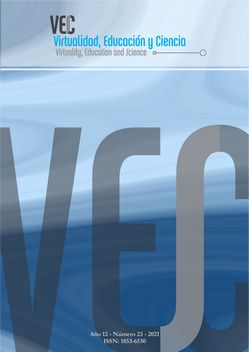Social institutions and ict: Permanence or transformation in university training in social sciences and education
DOI:
https://doi.org/10.60020/1853-6530.v12.n23.34466Keywords:
institutional challenge; education; information and communication technologies; university education; permanence; transformationAbstract
We empirically identify and delve into how current technological resources are incorporated into the daily life of institutions, and how under their various forms and uses they have not led to a significant transformation of ways of thinking and interacting with the dynamics of knowledge and social change. The technical utility conferred to technologies has limited the scope of institutional resources to enhance the transcendence and sense of transformation that such technologies are capable of deploying in the social and educational spheres. To demonstrate this, we analyse recent university training in social sciences and education, visualizing how this phenomenon is reflected in the final products (theses in education), and in their limited supply in terms of social impact results. We conclude with a balance of challenges for the university institution in the presence of innovations in the production and circulation of knowledge, and in the sociocultural changes that have taken place.
Downloads
References
ARDÈVOL, E., ESTALELLA, A. y DOMÍNGUEZ, D. (2008). Introducción: la mediación tecnológica en la prácTICa etnográfica, en Ardèvol, E., Estalella, A. y Domínguez, D. (coords.), La mediación tecnológica en la prácTICa etnográfica. San Sebastián: Ankulegi, pp. 9-30. Disponible en: https://www.ankulegi.org/wp-content/uploads/2012/03/0501Ardevol.pdf [20/08/2019].
COREA, C. (2004). Pedagogía y comunicación en la era del aburrimiento, en Corea C. y Lewkowicz, I., Pedagogía del aburrido: escuelas destituidas, familias perplejas. Buenos Aires y Barcelona: Paidós, pp. 41-70. Disponible en: http://otrasvoceseneducacion.org/wp-content/uploads/2019/01/Pedagogia-del-Aburrido-Lewkowicz-Ignacio-Cristina-Corea.pdf [15/08/2019].
ESTALELLA, A. y ARDÈVOL, E. (2011). E-research: desafíos y oportunidades para las ciencias sociales, Convergencia, 18(55), pp. 87-111. Disponible en: http://redalyc.uaemex.mx/src/inicio/ArtPdfRed.jsp?iCve=10515210004 [05/10/2019].
PACHECO-MENDEZ, T. (2017). Los recursos tecnológicos y el pensar la realidad social y educativa en las tesis doctorales en la UNAM, Revista Sapiens Research, 7(1), pp. 122-133. Disponible en: https://issuu.com/sapiens-research/docs/v7n1-2017_bcsr [28/06/2020]
PROULX, S. (2001). Les formes d’appropriation d’une culture numérique comme enjeu d’une société du savoir. Conferencia de Clausura en: Colloque franco-québécois : Gouvernance et usages d’Internet: vers un nouvel environnement normatif? Montreal: Universidad de Québec en Montreal. Disponible en: http://www.ac-grenoble.fr/ien.bourgoinashnord
/IMG/pdf_es_TUIC_Enjeux_et_modalites_de_mise_en_oeuvre.pdf [20/02/2020].
RUIZ, G. (2002). La sociedad del conocimiento y la educación superior universitaria, Revista Mexicana de Ciencias Políticas y Sociales, 45(185), pp. 109-124.
SPENCE, P. (2014). La investigación humanística en la era digital: mundo académico y nuevos públicos. Humanidades Digitales: una aproximación transdisciplinar, Janus, Anexo 2, pp. 117-131. Disponible en:
http://www.janusdigital.es/anexos/contribucion/descargar.htm;jsessionid=B448E0E0D02E6E521C88DE3791B78100?id=50 [11/03/2020].
TÍSCAR, L. (2009). El papel de la Universidad en la construcción de su identidad digital, Revista de Universidad y Sociedad del Conocimiento de la UOC, 6(1), pp. 15-21. Disponible en: https://dialnet.unirioja.es/servlet/articulo?codigo=2938407 [18/06/2020].
Published
How to Cite
Issue
Section
License
Copyright (c) 2021 Teresa Pacheco-Méndez

This work is licensed under a Creative Commons Attribution-NonCommercial 4.0 International License.
The generation of derivative works is allowed as long as it is not done for commercial purposes. The original work may not be used for commercial purposes.


